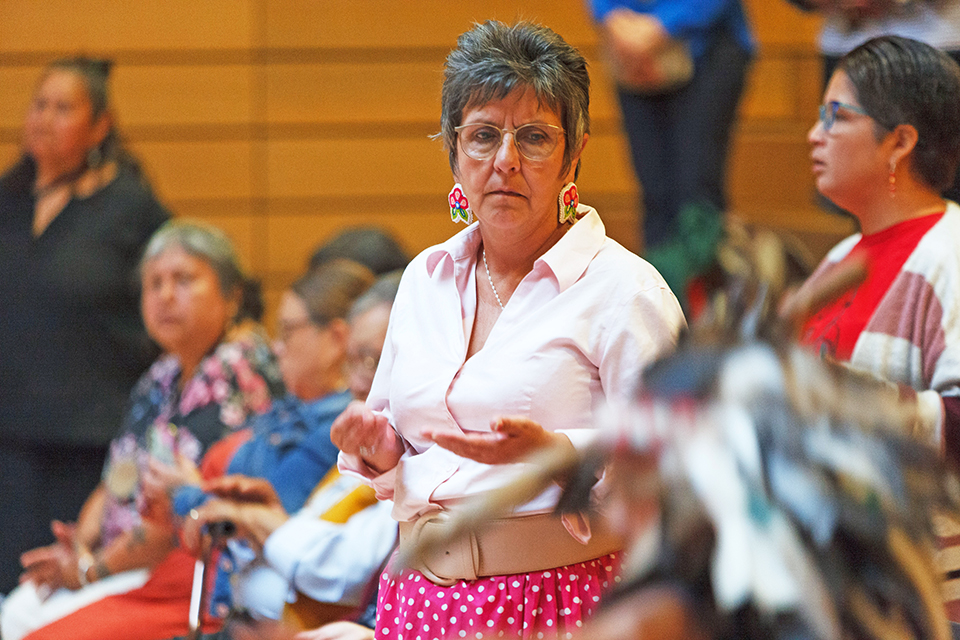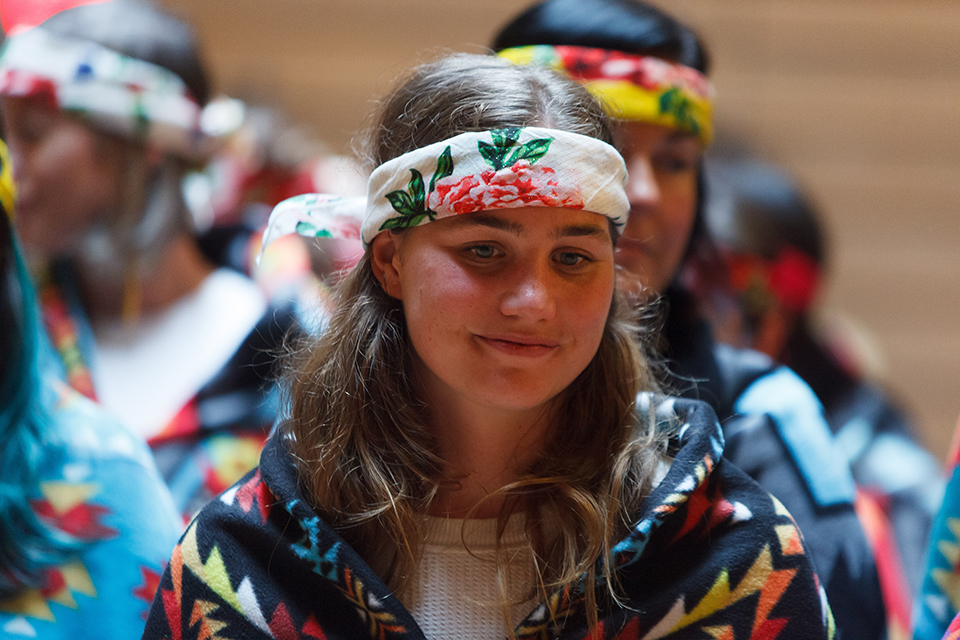Students in the Indigenous Graduate Education in Nursing (I-GEN) program were blanketed as part of a welcoming ceremony at the beginning of the program. Credit: UVic Photo Services
Human and Social Development June 20, 2024 – Stephanie Harrington
When Michelle Prince set out to become a nurse more than two decades ago, her birth mother gifted her books on traditional knowledge that travel with Prince today.
A ‘60s Scoop survivor, Prince was not raised in her culture, as part of the Tse’Khene Nation, or around her family, although she visited her birth mother occasionally as a child. Instead, she grew up in a Catholic French-Canadian family and heard negative stereotypes about Indigenous people.
The books Prince’s birth mother gave her included the Plants and Medicines of Sophie Thomas, by a traditional healer from Saik’uz First Nation, and Plants of the Carrier Nation, printed in the Carrier language.
“Although she gave me that gift at that time, I wasn’t in the right place. But I heard it, and it came with me,” Prince says. “I feel that was her knowing I was going to start my journey in having to understand where I came from.”
Now working as a community health practice consultant for the First Nations Health Authority on the unceded territory of the Coast Salish People, Prince was among 16 students in April who completed a bridging course called Indigenous Health Nursing Approaches to Wellness at the University of Victoria.
A unique and distinct approach to graduate nursing education
In the fall, 25 First Nations and Métis nurses from across BC will embark officially on their graduate studies at their home institutions as part of the Indigenous Graduate Education in Nursing (I-GEN) program, including eight students at UVic.
A partnership between Indigenous communities, UVic, UBC Okanagan, UBC Vancouver, Thompson Rivers University and Trinity Western University, the first-of-its-kind master’s program is designed to decolonize and Indigenize nursing where graduate students live and work. The goals include bolstering the retention of Indigenous nurses, improving health outcomes for Indigenous communities and strengthening relational partnerships with First Nations, Métis, and Inuk health leaders to improve Indigenous health nursing education, practice and research.
The BC Government recently committed $540,000 to support the co-development and delivery of the master’s program, including funding for students to enroll in graduate nursing education at the five BC institutions. Each partnered institution received funding to support the development of relationships with local Indigenous communities, curriculum development and student supports.
“Our government is committed to partnering with local Indigenous communities and supporting Indigenous students pursuing a career in nursing. With a critical need for more nurses, we are committed to removing barriers to accessing that education and ensuring that these students thrive,” said Lisa Beare, Minister of Post-Secondary Education and Future Skills. “Together, we are creating a path towards Indigenous-led education, to a B.C. where Indigenous students can fully realize their goals.”
Better education for Indigenous nurses

For the Indigenous health nursing research team, co-led by Lisa Bourque Bearskin, a Canadian Institutes of Health Research (CIHR) chair in Indigenous Health Nursing and associate professor in UVic’s School of Nursing, the master’s has been a long time coming.
Until the 1930s, Bourque Bearskin says Indigenous women were largely barred from attending nursing school in Canada, despite the fact that Indigenous healers and midwives traditionally held important roles in their communities.
The names of trailblazing Indigenous nurses—Madeleine Kētēskwew Dion Stout, Evelyn Voyageur and June Shakley, and others including Jocelyne Bruyer and Jean Cuthand Goodwill—were on the mind and in the heart of Bourque Bearskin at a Coast Salish welcome and blanketing ceremony last summer. Held for I-GEN students at First Peoples House, the ceremony was facilitated by local knowledge holder Doreen Peters and featured the Quwutsun Tzinquaw dance group.
“It’s because of their visionary leadership that we’re here today. Indigenous nurses before us, they planted these seeds,” Bourque Bearskin says.
A member of Beaver Lake Cree Nation in Treaty Six Territory, Bourque Bearskin worked as a nurse for 25 years in rural areas of Alberta and in Iqaluit, Nunavut. She says many remote and rural Indigenous communities find it increasingly difficult to retain nurses.
Bourque Bearskin is working on developing a curriculum for UVic—an advanced nursing practice that centres Indigenous wellness, integrates Indigenous knowledge and practices, and prepares Indigenous nurses for leadership roles.
“Indigenous nurses deserve a better education,” Bourque Bearskin says. “We want to be true to our word and offer the experience we put on paper.”
Ground-breaking Indigenous-led wellness course
A bridging course called Indigenous Health Nursing Approaches to Wellness, offered students insight over the past academic year into what a better education for Indigenous nurses might look like.
Bourque Bearskin and Métis/Cree nurse Leanne Kelly, an assistant teaching professor in the School of Nursing, co-developed the seminar, which was rooted in Indigenous ways of being and learning.
Each class followed Indigenous protocol, starting out with an Elder who grounded the group and led an Indigenous circle. Students read articles published by Indigenous scholars and then had the opportunity to meet those scholars, giving the research deeper context and meaning.
Flexibility with assignment formats meant that students could choose to explore course material through a number of media, such as storytelling or art, rather than submitting traditional academic papers. Prince was among those who opted to submit a personal digital story that explored health and wellbeing as a final assignment.
For Prince, who started working in health care as a registered care assistant in 1998 before becoming a licensed practical nurse in 2000 and a registered nurse in 2011, higher education was a harmful experience that deterred her from studying further.
“It was not a safe space for Indigenous nurses,” she says.
Prince says her experience at UVic has helped change her perspective, and she is already incorporating what she has learned into her nursing practice.
They really delivered on this being a new program that was truly rooted in Indigenous ways of being and learning and health and healing. It was groundbreaking for me in terms of walking the walk.”
—Michelle Prince
Community and institutional partnerships

The scale of I-GEN—encompassing Vancouver Island to the Lower Mainland to the Interior of BC—speaks to its need and impact. Every student enrolled has a journey to share and they’re looking to make change.
UBCO student Meghan Tetrault, who started her career as a community health nurse with the Splatsin First Nation, near Enderby, before working with the First Nation Health Authority in primary care, says I-GEN allows her to move her education forward in a way that has been professionally and personally fulfilling.
Métis on her father’s side, from Treaty 1 territory, Tetrault was disconnected from her culture for a long time. Still on an identity journey, Tetrault was looking for support in her education and a focus on Indigenous wellness so she could better serve the communities where she works.
“I knew I wanted to do this work in a good way, in a way that was reciprocal and accountable to all things going on in health care,” she says. “I wanted to be part of a better narrative.”
From the inspiring welcoming ceremony at First Peoples House in August that Tetrault says set the tone for the bridging course, to guest lectures and relationship-building with Indigenous scholars and leaders over the past two terms, Tetrault says she is overwhelmed with gratitude.
“It is education in a way I have never been taught before,” she says. “It has helped me do a lot of unlearning and also focusing on what Indigenous wellness is and how I can be part of that.”
UBCO School of Nursing Acting Director Jacqueline Denison says UBCO students who participated in the bridging course will continue on with their course work in the fall in the school’s Indigenous stream while planning their thesis and capstone projects.
“I-GEN is significant for UBCO and First Nations in the Okanagan region, as it has provided us with the vision and tools necessary to develop an Indigenous wellness pathway within our existing MSN [Master of Science in Nursing] program,” Denison says.
Trinity Western University MSN student and registered nurse Adelia Paul says I-GEN has given her the chance to learn more about Indigenous knowledge—and how vital it is for healing.
“IGEN has had a personal impact by helping me strengthen my roots, values and beliefs, which I will resort to when facing barriers or challenges in my professional or academic career,” she says.
Addressing TRC’s calls to action
Bourque Bearskin hopes that I-GEN will help shift long-standing systemic issues in health care. She says I-GEN is helping rewrite what nursing can look like for Indigenous people while confronting how the profession supported colonial institutions such as Indian hospitals.
Overcrowded, understaffed and segregated, Indian hospitals operated across Canada from the 1930s to 1980s, including in Nanaimo and at two other major facilities in BC.
“Our Indian hospitals removed that autonomy, and that recognition of our traditional healers,” Bourque Bearskin said in a recent interview with the Local Journalism Initiative. “[Nurses] were complicit in sustaining the system of systemic racism.”
I-GEN supports recommendations and calls from seminal reports, including the Truth and Reconciliation Commission’s (TRC) Calls to Action and In Plain Sight, the BC report which addresses widespread racism and discrimination experienced by Indigenous Peoples in health care settings.
Rani Srivastava, dean of Thompson Rivers University’s School of Nursing, says they are committed to acting on the TRC’s recommendations on health care.
“[I-GEN] is a wonderful opportunity for our students, faculty, and programs to work with and learn from the community and each other,” she says. “Thompson Rivers University is committed to honoring TRC recommendations and our partnerships with the Indigenous communities through culturally driven pathways to support Indigenous learners as leaders and strengthen communities.”
Métis Elder Barb Hulme, a retired military nurse and member of I-GEN’s UVic community hub, recently told freelance journalist Eagle Andersen that Indigenous-led healthcare will need to continue to grow.
“We’ve got a lot of work to do,” she says. “You have to crawl; you take one step forward, you fall down, you pick yourself up and you carry on.”
Creating footprints for other nurses to walk in
In the fall, eight students will begin fulltime studies in UVic’s Master of Nursing degree in Advanced Practice Nursing, Indigenous Wellness stream.
The Indigenous wellness course that Prince and others took will continue to be available to students across the partner institutions. The I-GEN team, meanwhile, will continue to seek community input and consider new ways to integrate Indigenous knowledge and practices in health into nursing.
Kelly, who is now a faculty lead for I-GEN at UVic, says she is witnessing a long-overdue cultural shift in nursing.





